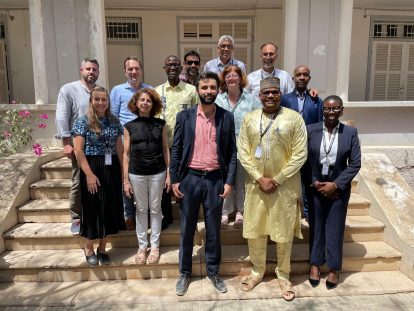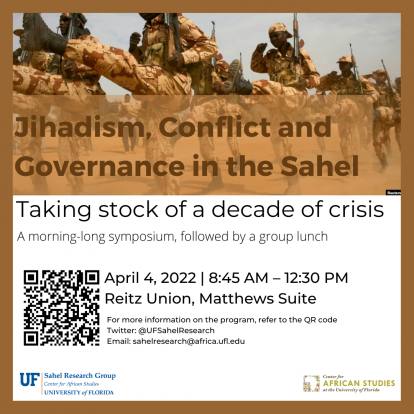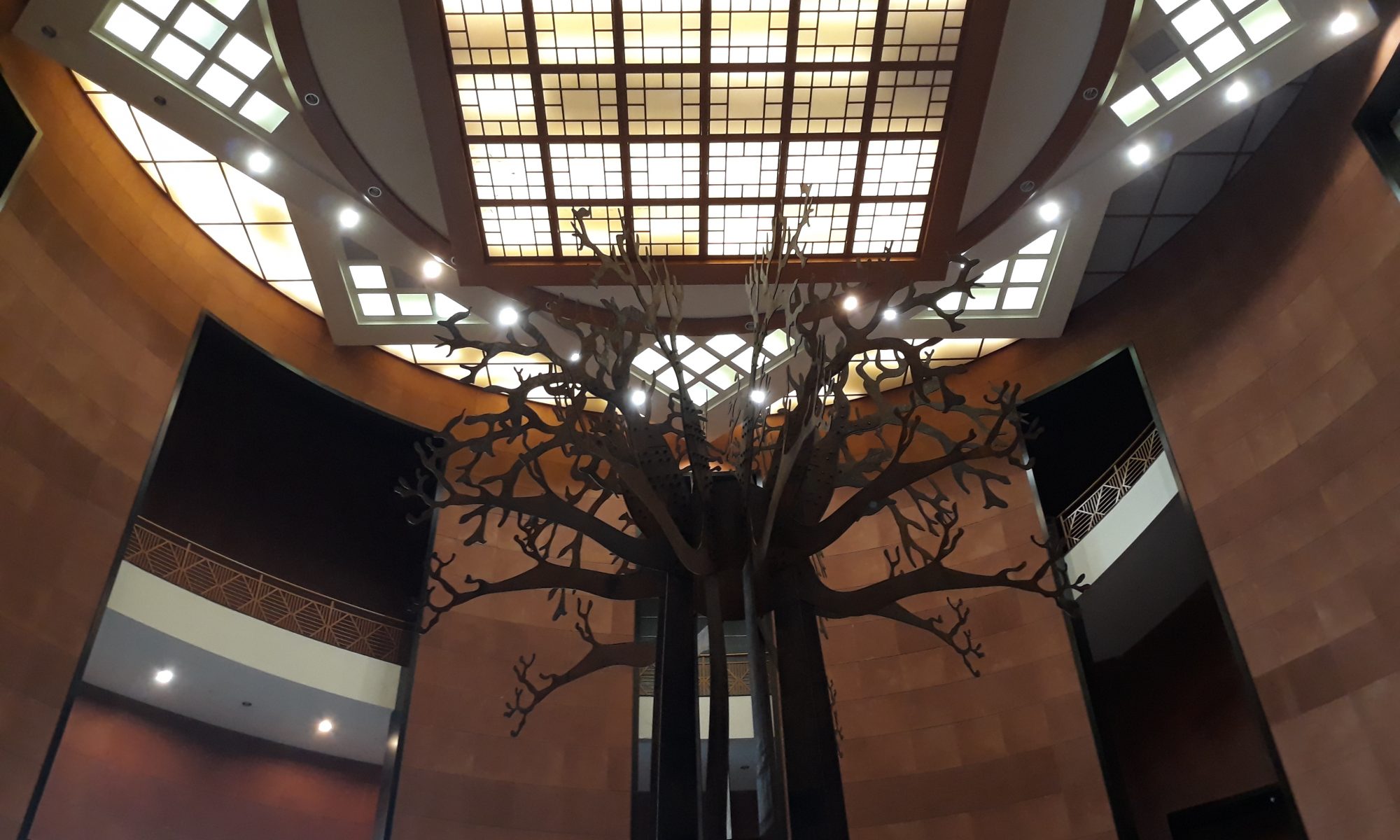
Fourth Annual Sahel Symposium: “Taking Stock of the Sahelian Jihads: Motivations, Impacts, Responses”
4-5 April 2025
University of Florida, Gainesville.
Long a peaceful—if poor and underdeveloped—region, the Sahel has tragically become the epicenter of militant Islamist activity in Africa since the collapse of Mali in 2012. In the crucible of a facilitating international environment and domestic state weakness, violent extremist groups have proliferated, splintered, and sought affiliations and support from elsewhere in the Muslim world.
As a result, there is an often-confusing array of groups and names at any given moment, at times making common cause but also fighting among themselves. The two main jihadi branches in the Sahel are largely local affiliates of Al-Qaeda and of the Islamic State, respectively—the al-Qaeda-affiliated Group for the Support of Islam and Muslims (Jama’at Nusrat l-Islam wal-Muslimin, JNIM), and the Islamic State, West Africa Province (ISWAP)—although the permutations and relations among these are shaped by local contexts.
Now in their second decade, there are still many more questions than answers about the drivers of the Sahelian jihads. As Luca Raineri has noted, “While jihadism appears to be on the rise in Africa, the explanations of violent extremist groups’ capacity to foment jihadi insurgencies and mobilize recruits remain poorly understood.” In particular, the relative importance of identities and of ideologies in motivating jihadi activity remains very poorly understood, and many key questions remain:
How do considerations of ethnicity or of social hierarchy play into the dynamics of jihadi groups? Are these groups sometimes in effect “ethnic militias”? What is the relative importance of material and secular grievances versus religious ideologies in motivating people to join and participate in jihadi activity? How voluntary is such adhesion? What is the role of coercion or force as motivators for joining? What is the relationship between jihadi groups and criminal networks of drug trafficking or smuggling? What explains the varying relations among jihadi groups with local populations? When and why are jihadis seen as the best alternative (or as the lesser of two evils) by locals?
This symposium brought together several experts with deep knowledge and research experience on Sahelian jihadi movements to address these and related questions about the forces driving these movements. We expect to communicate a final program by mid-February.
Participants included Leonardo A. Villalón, Olivier Walther, David Russell and Baba Adou (University of Florida), Alex Thurston (University of Cincinnati), Ibrahim Yahaya Ibrahim, Jean-Hervé Jezequel and Ibrahim Maïga (International Crisis Group), Vincent Foucher (CNRS), Halimatou Hima (Brookings Institution), and Ambassador Alexander Laskaris (U.S. Department of State, ret.).
Download the Poster or the Program.
Third Annual Sahel Symposium:  “Creating a Safe Space for Analysts, Activists and Scholars”
“Creating a Safe Space for Analysts, Activists and Scholars”
University of Florida’s Sahel Research Group & International Crisis Group’s Sahel Project
West Africa Research Center, Dakar, Senegal, May 13-14, 2024
About the SRG/ICG annual symposium
For the past two years the University of Florida’s Sahel Research Group (SRG) and the International Crisis Group’s (ICG) Sahel Project have co-sponsored an annual symposium, intended to promote dialogue and exchange between academics and policy-makers about the extraordinary challenges facing the Sahel as a region.
Background and Objective
The experience of these very fruitful exchanges leads us to propose an expanded version of the symposium this year, to be held in the region, and in a change, involving over a dozen public intellectuals from Mali, Burkina and Niger as well as observers from various countries and organizations. The Sahelian situation continues to evolve rapidly, with increasingly high stakes both for the region and internationally.
The past year has seen an unexpected coup in Niger and controversy around the ongoing transition in Chad, while on the positive front Senegal experienced a peaceful democratic transition. Alliances across the region have shifted as the Sahel is increasingly drawn into global geopolitical battles. Of particular concern, transitional governments in Mali, Burkina Faso, and Niger increasingly have taken measures to stifle dissent from both internal and external critics, often using authoritarian and violent means. In this context, analysts, activists, and scholars in the Sahel often struggle to freely express their perspectives on conflict dynamics and political developments.
In response to this situation, the Sahel Research Group and Crisis Group propose to structure our third annual symposium so as to create a safe space where local public intellectuals, experts and policymakers can exchange ideas freely. By fostering conversation on the region and its issues, we hope to refine our analysis and create a network of scholars and activists in open dialogue about the multiple challenges of the region. The ultimate goal is to facilitate the free exchange of trustworthy information, which we believe is key to halting the surge in displacement and violence resulting from this decade-long crisis.
Organizing Committee
- Leonardo Villalón, Sahel Research Group, University of Florida.
- Jean-Hervé Jezequel, International Crisis Group Sahel Project, Dakar.
Speakers and Participants
In addition to members of the University of Florida’s Sahel Research Group and International Crisis Group analysts, we invited a number of key “voices from the Sahel,” including scholars, journalists, analysts, and civil society leaders, to serve as panelists and roundtable participants. A selected number of policymakers and other key stakeholders were also invited to attend the symposium and participate in discussions.
Output
Following the symposium, ICG’s Sahel Project will produce a policy brief under Chatham House rules. The policy brief is not intended for publication and will be circulated to a limited number of partners.
Symposium Agenda
 2nd Annual SRG/ICG Symposium on the Sahel
2nd Annual SRG/ICG Symposium on the Sahel
More than a decade after the March 2012 coup and government collapse in Mali, the Sahelian political landscape has been radically transformed, characterized by a new governance context that has been largely shaped by rising insecurity, military coups, and the failure of the French and multi-lateral regional stabilization efforts.
The presence of jihadist groups and their ability to durably seize territory have been constantly growing in the last decade, especially in the central Sahel. In addition, a series of military coups has recently struck the central Sahel as well as the wider West Africa region. This includes Mali (August 2020 and May 2021), Chad (April 2021), Guinea (September 2021), Burkina Faso (January 2022 and October 2022), and a failed coup attempt in Niger (March 2021). A new generation of military leaders is replacing the aging and largely discredited ruling elite. The French-led stabilization architecture in place since 2013 is also falling apart. Multilateral regional stabilization efforts are in a difficult situation. The G5 Sahel is at the end of its rope and struggles to remain relevant after Mali’s withdrawal.
This second ICG/SRG annual symposium addresses these issues. It brings together a number of scholars and practitioners in the policy community working on diverse aspects of the contemporary Sahel to present new research and exchange perspectives on the trajectory of the past decade and on prospects for the future.
This live event is free and open to the public (no virtual participation). Participants from outside the University of Florida are kindly requested to pre-register for the event by sending an email with your name and affiliation here. We gratefully acknowledge support for this event from the UF Center for African Studies and the Office of Research.
 Jihadism, Conflict and Governance in the Sahel: Taking stock of a decade of crisis
Jihadism, Conflict and Governance in the Sahel: Taking stock of a decade of crisis
A decade after the March 2012 coup and the collapse of the Malian state, the Sahelian political landscape has been radically transformed, characterized by a new governance context that has been largely shaped by jihadism and conflict.
This international symposium brings together a group of scholars with deep expertise, and currently working on diverse aspects of the contemporary Sahel, to present new research and exchange perspectives on the trajectory of the past decade, and on prospects for the future.
Venue: April 4, 2022, Reitz Union, University of Florida
Speakers and Participants
- Leonardo Villalón, Sahel Research Group, University of Florida.
- Olivier Walther, Sahel Research Group, University of Florida.
- Luca Raineri, Sant’Anna School of Advanced Studies.
- Edoardo Baldaro, Gerda Henkel Research Fellow, Sant’Anna School of Advanced Studies.
- Jean-Hervé Jezequel, International Crisis Group Sahel Project, Dakar.
- Ibrahim Yahhaya Ibrahim, International Crisis Group Sahel Project, Dakar.
- Adib Bencherif, University of Sherbrooke.
- Mamadou Togola, University of Leiden.
- Azizou Garba, Centre National d’Etudes Stratégiques et de Sécurité, Niger.
